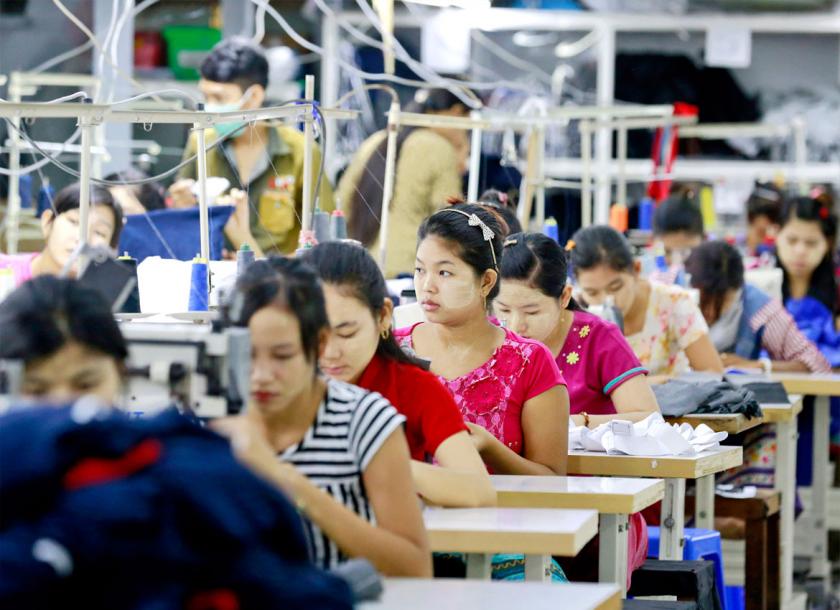European Union (EU) monitoring mission expected to visit Myanmar to withdraw Cambodia’s market privileges in mid-February
4 มีนาคม 2563
An EU monitoring mission is expected to visit Myanmar again before this summer following the EU commission’s decision to withdraw Cambodia’s market privileges in mid-February.
Kristian Schmidt, the EU ambassador to Myanmar, told The Myanmar Times in an exclusive interview that he expects the mission to arrive before summer with an aim to examine and review the country’s progress in improving human rights and labour situations.
Since then, the EU has been waiting for the Myanmar government to deliver on some of its commitments to improve the situation in Rakhine, Schmidt added.
That’s raised concerns of a similar move by the EU in Myanmar among some local manufacturers. Daw Khine Khine Nwe, secretary-general of the Myanmar Garment Manufacturers Association (MGMA), said if the EU decides to take action against Myanmar, it would tarnish the interest of potential investors in the garment industry and come at the expense of new jobs.
Schmidt said: “We see things in Myanmar [to be] better than they are in Cambodia. We make decisions on the basis of objective facts and findings, and they don’t come as a surprise.”
He cautioned though, that there remain multiple pressing issues to be addressed and resolved by the Myanmar government. Humanitarian access being blocked in Rakhine and other states, for instance, is a significant problem. There is also an ongoing shutdown of the internet, blocking access to information in nine Rakhine and Chin cities.
Schmidt revealed this makes it difficult for him to submit good progress reports to his superiors in the EU. Persistent bureaucracy, red tape and obstacles to the delivery of the humanitarian aid to people in need has posed a huge frustration, he added.
On Myanmar’s side, the garment industry has taken the initiative to demonstrate its compliance with the requirements.
“The Myanmar government is trying very hard, and it is working with the industry closely on improving the situation,” said Daw Khine Khine Nwe.
For example, the MGMA recently launched a Volunteer Labour Compliance Assessment with the International Labour Organisation’s support, starting with two pilot factories. The checklist could help manufacturers conduct self-assessments on whether working conditions satisfy international legal and labour-rights standards, including those from the EU and the US.
Meanwhile, the EU ambassador said engagements from the Myanmar side are being recognised. Last year, the EU commended the passing of a child rights laws in parliament to address concerns on child rights.
“This is the reason why we feel that this process is constructive and useful, and it took off some of the pressure and certainly laid the basis for the different paths - Cambodia compared to Myanmar,” Schmidt said.
Myanmar currently enjoys tariff-free access to the EU bloc for all exports except weapons and ammunition under the Generalised Scheme of Preferences (GSP). The garment industry has emerged as one of the major beneficiaries of these trade privileges, and has grown to rely on the European market, which now imports over 45pc of garments produced in Myanmar.
The value of garments exported to the EU has grown from US$900 million (K1.2 trillion) in 2012 to US$4.6 billion in 2018, accounting for more than 30 percent of Myanmar’s total exports in the same year.
The EU’s special trade status to Myanmar is critical to attracting more manufacturers setting up factories in the country as manufacturers move their supply chains from China to Southeast Asia.
“The recent US-China trade tension plus the current coronavirus outbreak are speeding up the process of major industries shifting manufacturing bases to Southeast Asia [from China],” said a source from a global shoemanufacturer with factories in Myanmar, Cambodia and other Southeast Asian countries.
With Vietnam and Indonesia seeing a looming shortage of workers for low-skilled jobs, more manufacturers will look to Myanmar as a production base as risk diversification measures, if the EU maintains its trade preference for Myanmar, the source added.
Although there have been discussions on partial withdrawal of Myanmar’s trade privileges for certain sectors, the EU will continue to engage with the Myanmar government on development aid and trade support, said a source close to Brussels who declined to be named.
It’s important to recognise that the EU has few tools besides GSP to remind Myanmar to uphold human rights, freedom of expression, and labour-rights standards, the source said.
The garment industry has vowed to work carefully with the government to comply with the regulations and conventions. The MGMA told Myanmar Times that it stood ready to show the improvement of the sector over the years.
“We are very cautious, but not yet worried,” said U Min Soe Han, label officer of the MGMA.
(The Myanmar Times: https://www.mmtimes.com/news/e











